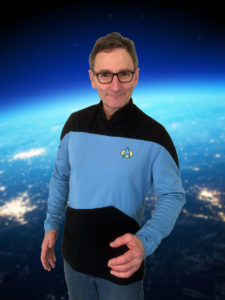With the 50th anniversary of Star Trek, it’s a great excuse to flaunt this great franchise, the ultimate travel series – and figure out why it remains so appealing. Creator Gene Roddenberry gave us much more than just a sci-fi TV adventure. He gave us a platform in which to examine timeless philosophical questions and modern social issues. It’s a morality play with the backdrop of a universe with endless destinations.
I’ve always liked Star Trek. Not to a fanatical “Trekkie Convention attendee wearing a Captain Kirk outfit” kind of degree (though I do own a Star Trek shirt, purchased for a Halloween party – see photo) but I’ve definitely always been a fan, starting with the first series which originally ran from 1966 to 1969 and beyond in re-runs. The attraction might in part have been due to my Dad’s interest in science…and science fiction. Popular Science magazines and Isaac Asimov paperback books were a standard feature on our coffee table when I was growing up. Plus there’s the fact that we never had a car. “Going on a holiday” wasn’t even in our vocabulary. Hence, the appeal of heading off once a week, via our old TV set, to “explore strange new worlds, to seek out new life and new civilizations, to boldly go where no man has gone before.” It was the ticket to travel that I yearned for, with a new destination every week – not to mention all the iconic Shakespearean-esque characters (and aliens!) facing life’s biggest challenges, and occasional wacky fun thrown in for laughs.
And then of course, there were all the other Star Trek series that came after the first one. They are like a travelogue of my life. My wife and our oldest son (who was four years old when it started) watched The Next Generation (1987-94) with faithful dedication every week. By the time Deep Space Nine (1993-99) came along, two more kids had been added to our brood, so the show was a welcome weekly respite from diapers and toddler-tantrums. Then came Voyager (1995-2001) – when I happily discovered that our offspring were fast becoming little Trekkies. And finally, Enterprise, the last series (2001-05). Since our kids were a little older, we were able to have great discussions and sometimes heated debates about issues brought up on the show each week. Star Trek was part of the wallpaper of their childhoods, as well as mine. And of course the thirteen (yes, thirteen) Star Trek movies took us out of our house and into the movie theatre, where we experienced an almost poignant sense of community with other fans of the franchise. Nothing like munching popcorn with a few hundred of your new best friends, and cheering wildly together when a favourite Star Trek character appears on the big screen.
 The whole Star Trek experience consistently takes us on a journey away from (let’s face it) our sometimes-dreary existences to alien worlds, with bursts of quantum mechanical phenomena. Not that my life has been boring. But it sure hasn’t been as exciting as a grueling and heroic fight against the Borg, or overcoming a mind-boggling disaster with seconds to spare.
The whole Star Trek experience consistently takes us on a journey away from (let’s face it) our sometimes-dreary existences to alien worlds, with bursts of quantum mechanical phenomena. Not that my life has been boring. But it sure hasn’t been as exciting as a grueling and heroic fight against the Borg, or overcoming a mind-boggling disaster with seconds to spare.
What I have come to realize with every new Star Trek movie, series, and episode is how relevant each piece can be, how the problems faced by each crew are the problems faced by humankind, undergirded by a philosophical framework for handling many of life’s difficult questions. For instance, you might remember these great episodes
- The Enemy Within: Captain James T. Kirk splits into his good and evil selves, competing with himself for what is right and ripped apart by what is wrong.
- The Offspring: Data creates an android “daughter”, and attempts to instruct her about correct behavioural norms and social customs. Moving on a number of levels.
- In the Pale Moonlight: In the midst of a war, Captain Benjamin Sisko must decide whether to betray his ideals for the greater good.
- I, Borg: Captain Jean Luc Picard is forced to overcome his prejudices against an enemy that in many ways ruined his life.
In the Star Trek universe, the “Prime Directive” is the guiding principle of the united Federation of Planets. It prohibits Starfleet personnel from interfering with or denigrating the internal development of other cultures and civilizations. From the very first episode, Captain Kirk found himself getting into extremely conflicting situations, and sometimes going with his gut and defying the Prime Directive. In all the series, characters are regularly confronted with situations that challenge their ideas of right and wrong, dualisms of mind and matter, paths diametrically opposed to one another, with no middle ground or easy third choice. Nevertheless, the Prime Directive sets a standard for viewers to consider and debate. It asks us to do more than just enjoy the action – it asks us to think about the merits of respecting others’ personal beliefs, even when they are very different than our own, and to reflect on whether situations ever warrant imposing our dogmas and doctrines on others. Heady stuff, indeed.
The show also revels in science; it’s couched in physics and described by mathematics. The characters use “sensors” to measure everything that comes their way. They can count on the most powerful computers to analyze all manner of data. They rely on empirical evidence to make predictions and tough decisions.
The Federation overseeing Starfleet is the United Nations on steroids. Roddenberry envisioned a universe with liberty, equality, justice, peace and universal cooperation. As Picard warns, “With the first link, the chain is forged. The first speech censured, the first thought forbidden, the first freedom denied, chains us all irrevocably. …The first time any man’s freedom is trodden on, we’re all damaged.”
 Leonard Mlodinow is a physicist at the California Institute of Technology, recognized for a number of groundbreaking discoveries in physics. He is also a former Star Trek screenwriter, and the author of several books including Feynman’s Rainbow: A Search for Beauty in Physics and in Life. In an article published in Newsweek magazine called “Confessions of a Star Trek Writer”, he wrote:
Leonard Mlodinow is a physicist at the California Institute of Technology, recognized for a number of groundbreaking discoveries in physics. He is also a former Star Trek screenwriter, and the author of several books including Feynman’s Rainbow: A Search for Beauty in Physics and in Life. In an article published in Newsweek magazine called “Confessions of a Star Trek Writer”, he wrote:
“What sets Star Trek apart is the imagination put into every detail, from the set and prop design, to the issues raised in the episodes, to the backstory of the various cultures depicted. Only on Star Trek could you have been encouraged one week to examine whether an android could be a sentient being…and fantasize on another about intelligent aliens that, like bees or ants, seem to act with a collective consciousness.”
I probably don’t need to mention how excited I was to hear the announcement by CBS that they will be bringing Star Trek back into our lives with a new TV series in the franchise, set to debut in the spring of 2017. At the San Diego Comic-Con 2016, it was announced that the new show will be called Star Trek: Discovery. Beam me up, Scotty – I definitely want to be on board for this one. And if you’re wondering whether you should check it out, I’ll leave you with a quote from the Borg: “Resistance is futile.”









“Resistance is futile” in my just trying to skim this article too. I love the Star Trek franchise and have also enjoyed the personal conflict Star Trek captains have had with The Prime Directive. Great article and fantastic photo of you in your shirt. It looks like you are set to boldly go where no writer has gone before!
Bill thanks you for your kind comments…and is also thankful that you were unable to resist.
I love how this article highlights the moral dimensions of the various generations of Star Trek shows! The moral conundrums grappled with in Star Trek are not only allegories for our modern world but may in fact be foreseeable dilemmas of our future. Great reading!
You’re so right, Douglas – glad you enjoyed the article!